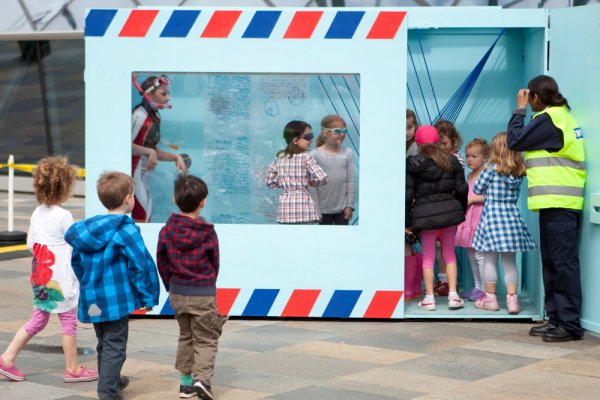
Photo: Steve Brown
A playful outdoor world
Kazzum stopped creating work for young audiences in indoor spaces to focus on the outdoor arts sector. Daryl Beeton explains why.
Kazzum had been touring theatre for young audiences to theatres across the UK since 1989, but in 2008 something happened that opened our eyes, and the doors, to a whole new range of family audiences. We were awarded a small commission to create a family show specifically for the outdoor arts sector. We suddenly found ourselves reaching a diversity of audiences that had never seemed possible when working in black box spaces, and were astonished by the immediacy and intimacy created between the performers and audiences. It was such an inspiring moment that in 2011 we stopped creating work for indoors and now only produce work for outdoor and site-specific spaces.
Our work is for young audiences. We are about the theatrical experience, which we believe works as well in a festival field as on a traditional stage, in a classroom as well as in a car park. We don’t do traditional shows or have audiences sitting in rows. Our audiences move around, get involved and become part of the action, and this all happens within their own local spaces – play centres, parks, estates, city farms – providing opportunities for new audiences who don’t regularly experience the arts to do so in an accessible and welcoming way.
Arts events held outdoors are usually free and this immediately removes a key barrier for many lower income families
Our work involves young people in its creation: we consider young people to be creative partners as we develop shows. This ensures the final, professional production is relevant, fresh and created with our young audiences in mind. This participatory approach to theatre-making and the relationship we aim to create with family audiences sits well within the outdoor arts arena and the audiences it attracts.
Outdoor arts has grown from its roots in the community arts movement into a developed, professional sector encompassing theatre, performing arts, music, visual art, circus, mela and carnival. In 2013, The Audience Agency completed an initial phase of national outdoor arts sector research, forming the largest study of its kind ever completed. One of the report’s key findings showed that audiences are more local, diverse and representative of the population as a whole with 60% of audiences predominantly local and, in this sense, distinct from audiences for indoor arts. Furthermore, 65% of audiences are regular but not frequent attendees of outdoor arts events, demonstrating that outdoor arts attracts less engaged audiences.
Since working outdoors, our audiences have become more diverse, in terms of both cultural and economic background. Arts events held outdoors are usually free and this immediately removes a key barrier for many lower income families. Outdoor arts often take place in spaces that audiences are familiar with and feel comfortable in, spaces in their community that they use every day. Indoor spaces can sometimes pose a barrier to families who might believe it is not for them, or worry if their children make too much noise (a situation which is not being helped by the current Theatre Charter which encourages ‘better behaviour from audience members’). In fact, we want our audiences to make a noise and respond to what is happening in front of them. Many of our audiences do not set out to see theatre that day, but come across our work as they are going about their everyday lives. They are free to come and go as they please, and this challenges us to create work that really holds their attention, asking them to spend half an hour in our playful world.
We have recently joined forces with the Outdoor Arts Catalyst Consortium, a group of six outdoor arts organisations which have come together to campaign for the future of the sector. We want to raise awareness about outdoor arts around the UK and explain the hard work that goes into creating these free performances. In the face of a tough economic climate and continued cuts to the arts, the consortium is garnering support to continue to create high-quality work that really engages diverse family audiences.
Daryl Beeton is Artistic Director of Kazzum.
www.kazzum.org
Join the Discussion
You must be logged in to post a comment.